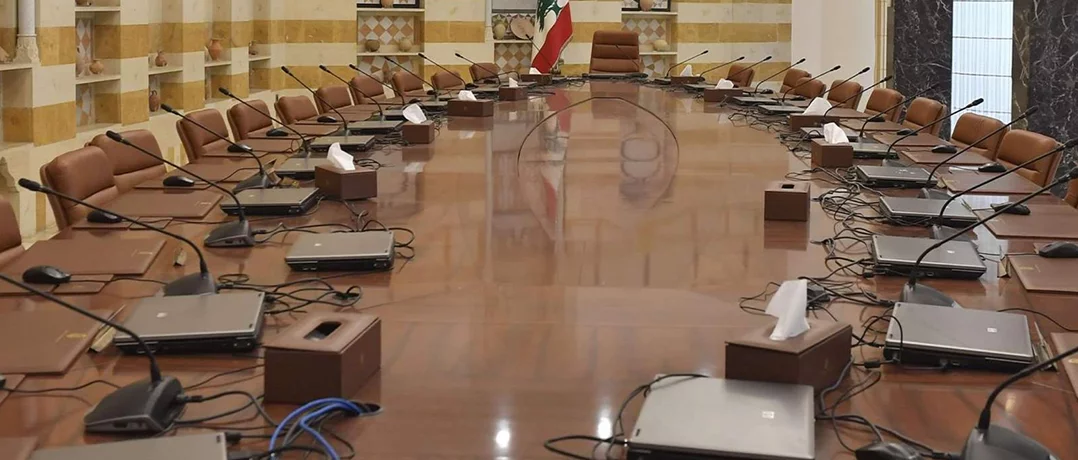Lebanon’s Cabinet met in Baabda to review the army’s disarmament plan, affirm election timelines, and reinforce state authority amid rising border tensions.
Lebanon moves toward state control of arms

Amid a charged political and security landscape, Lebanon’s Cabinet convened on Monday, October 6, 2025, at Baabda Palace for a session described as “pivotal.” The meeting focused on the Lebanese Army’s first report on the plan to place all weapons under state control, a sensitive initiative shrouded in official secrecy to preserve institutional integrity and prevent political interference during its initial evaluation phase.
The session came against the backdrop of heightened tensions along the southern and Bekaa fronts, marked by airspace violations and sporadic Israeli strikes, which complicate any practical implementation of the army’s plan. According to government sources, confidentiality aims to shield the process from media speculation and partisan tug-of-war.
Baabda decisions: From symbolic discipline to field challenges
The decisions emerging from the Baabda session reflected a dual course, tightening internal discipline and reinforcing state authority on one hand, while addressing ongoing security and military challenges on the other.
The decision to suspend the activities of the “Risalat” Association pending administrative and judicial investigations into the Raouche Rock lighting incident was seen as a symbolic act of discipline, signaling the government’s intention to reassert control over public space and reaffirm state authority over national symbols at a politically sensitive moment.
Although administrative in nature, the decision carried clear political and media dimensions. Observers viewed it as an assertive message against any overreach or defiance of the law, and as an attempt to reinforce the principle that the state remains the sole arbiter in public life.
Regarding the army’s plan, Army Commander General Rodolphe Haykal presented a detailed briefing on the deployment strategy south of the Litani River, addressing logistical hurdles, field challenges, and coordination with UNIFIL forces. Implementation, he explained, is unfolding gradually through multiple phases in line with the delicate and evolving situation on the southern front.
Information Minister Paul Morcos clarified that secrecy “does not imply ambiguity,” but rather serves to protect state institutions and prevent the political exploitation of sensitive security files. He conveyed that President Joseph Aoun stressed the importance of unified security decision-making and national stability, noting that his recent visit to New York “yielded tangible results and reaffirmed Lebanon’s diplomatic standing.”
Prime Minister Nawaf Salam, for his part, commended U.S. President Donald Trump’s initiative calling for an immediate ceasefire in Gaza and rejecting any population displacement, asserting that no regional settlement “can come at the expense of Lebanon or its cause.”
All parties reaffirmed that the upcoming parliamentary elections will be held on schedule. In parallel, international partners announced $230 million in financial and logistical aid for Lebanon’s security forces, $190 million for the army and $40 million for the Internal Security Forces, to strengthen the state’s capacity to implement UN Resolution 1701 and reassert its presence in the south.
Army plan in the South: Implementation continues despite obstacles
Political analyst and columnist Ibrahim Haidar told The Beiruter that the Cabinet had effectively granted legitimacy to the army’s plan for areas south of the Litani River. The plan, divided into five stages, is being implemented gradually, with current focus on southern Lebanon.
Haidar noted that ministers from across the political spectrum viewed the report presented by General Haykal as “excellent,” effectively translating into official approval of its content. He added that the plan is no longer secret, as the army had already confirmed its commitment to enforcing the ceasefire in the south and identifying key obstacles, chiefly Israel’s ongoing occupation of certain border points, which obstructs full deployment.
According to Haidar, the Lebanese Army has already entered Hezbollah-controlled areas and seized weapons depots, confirming that implementation is underway on Lebanon’s side. He emphasized that the ongoing secrecy is primarily institutional rather than political.
U.S. Aid: Strengthening the military, not the government
Commenting on the recently announced U.S. assistance, Haidar explained that the $230 million package is intended to support the Lebanese Army and Internal Security Forces, not the government as a political entity. Washington, he said, aims to reinforce Lebanon’s security institutions amid financial collapse, prioritizing their role in maintaining order and implementing Resolution 1701.
The aid does not include direct combat equipment but logistical support to sustain stability. Haidar added that the funding aligns with a broader U.S. strategy to ensure that all weapons are brought under state authority before year’s end, while avoiding overt political endorsement of the Lebanese government.
He further criticized Washington’s approach, noting its “clear bias toward Israel” and questioning the absence of parallel pressure on Tel Aviv to withdraw from occupied Lebanese territories. “Why isn’t there equal pressure on Israel to fulfill its obligations?” he asked, referring to the lack of response to the “step-by-step” proposal and the absence of U.S. guarantees to Lebanon regarding Israeli withdrawal.
“Risalat” decision: A settlement to avoid political escalation
Haidar also addressed the Cabinet’s decision to suspend the “Risalat” Association, describing it as a political settlement aimed at preserving cabinet unity and preventing escalation. He revealed that Prime Minister Najib Mikati proposed suspension, rather than full dissolution, to avoid infringing on public freedoms or setting legal precedents that could later be used against other civil organizations.
The decision, Haidar added, bore the imprint of Speaker Nabih Berri, who played a mediating role after Hezbollah objected to punitive measures targeting the association. He concluded that the “Risalat” case could take additional political and media turns, as it remains tied to the government’s ability to impose administrative and security discipline within the constraints of the current power balance.



